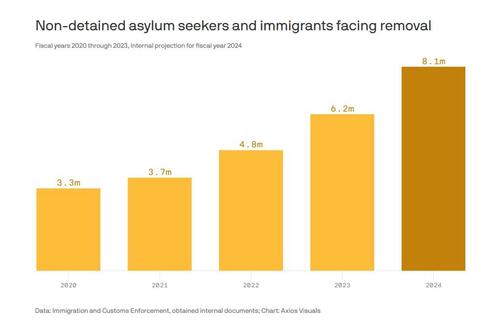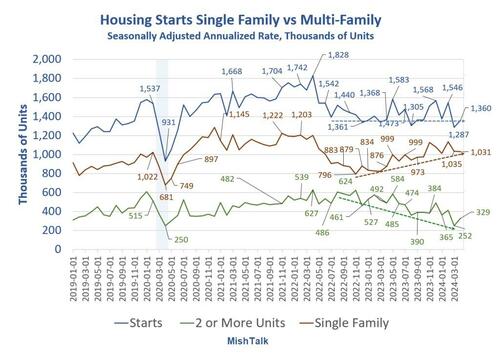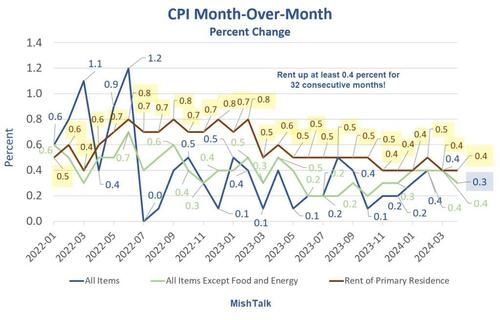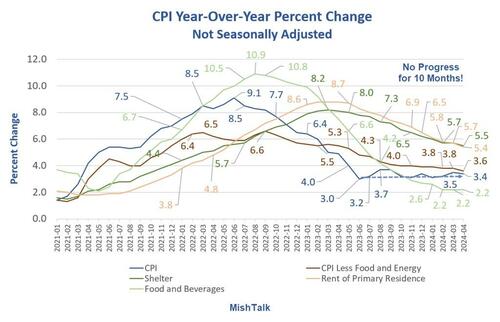Millions of immigrants keep pouring in. New residential construction has stalled and multi-family construction is in decline. Completions are rising, but is that enough housing?
More Than 8M Migrants Will Soon Be Living in the US
Axios reports Migrant Backlog to Hit 8 Million Under Biden by October
More than 8 million asylum seekers and other migrants will be living inside the U.S in legal limbo by the end of September — a roughly 167% increase in five years, according to internal government projections obtained by Axios.
Why it matters: That’s up from about 3 million in 2019 — a sign of how the underfunded and outdated U.S. immigration system can’t keep up with the rapidly growing migrant population driven by new border surges.
The backlog has left millions of people living in uncertainty about whether they’ll be allowed to stay in the U.S. — or facing deportation — often for years.
An estimated 2 million of the migrants in the backlog likely will be high-priority cases — mostly those who have orders to be deported to their home countries, and some with criminal records or pending criminal charges, according to the documents.
The New York Post reports More Than 8M Migrants Will Soon Be Living in the US, a 167% Increase in 5 Years
The Biden Administration anticipates that number will swell to 8 million by Oct. 1, according to Department of Homeland Security documents sent to Congress and obtained by Axios.
A quarter of the migrants caught in the backlog limbo — an estimated 2 million people — are those who have already been slated for deportation by a judge, as well as suspects facing criminal charges.
Because of the way the immigration system works, even after a judge has issued a ruling a migrant must be deported, they are able to appeal and challenge the deportation order. While that takes place, the deportation is put on hold, according to the legal help website nolo.com.
Where are they living and who is paying for the shelter?
Housing Starts
Housing Starts from Census Department, chart by Mish
Since late 2022 multi-family construction has fallen by about 50 percent. Single-family construction is up by about 25 percent. Total construction is flat.
Price of Rent
Rent rose another 0.4 percent in April. Food and beverages were flat with food at home declining but food away from home rising.
CPI data from the BLS, chart by Mish
On May 15, I noted CPI Up 0.3 Percent With Rent Still Rising Steeply
Yet Another Groundhog Day for Rent
Rent of primary residence, the cost that best equates to the rent people pay, jumped another 0.4 percent in March. Rent of primary residence has gone up at least 0.4 percent for 32 consecutive months!
The “rents are falling” (or soon will) projections have been based on the price of new leases and cherry picked markets. But existing leases, much more important, keep rising.
Only 8 to 9 percent of renters move each year. It’s been a huge mistake thinking new leases and finished construction would drive rent prices.
Rent Year-Over-Year
For well over two years, economists, including Fed Chair Jerome Powell have been expecting bigger drops in the year-over-year price of rent.
How much is illegal immigration fueling the price of shelter? I don’t have an answer and I have not seen anyone discuss this.
The competing forces I mentioned are completion of housing units, a lag in way the BLS calculates rents, and rising inventory of new homes for sale.
Homebuilders Have the Most Inventory Since May 2008, Big Discounts Coming
On the positive side, Homebuilders Have the Most Inventory Since May 2008, Big Discounts Coming
However, not many illegal immigrants can afford a house. And housing starts are tumbling, especially multi-family.
Inflationary Forces
Biden’s energy policy is inflationary; student loan cancellations are inflationary; the push for union wages are inflationary; the inflation reduction act is inflationary; tariffs (both Trump and Biden are guilty) are inflationary; deficit spending is inflationary; and the need to shelter millions of migrants is inflationary.
Meanwhile, there are signs the economy is slowing. For discussion, please see Discretionary Spending Tumbles at Target, Shares Drop 10 Percent
This is not a pretty mix.



